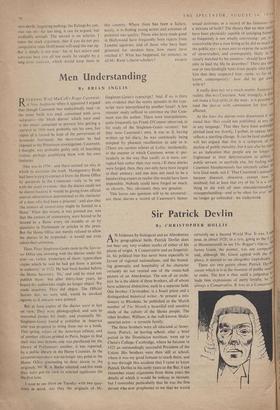Men Understanding
By BRIAN INGLIS
FVIE\\ING R NlacColl's Roger Cavemen!: Nell' /Wig/He/it when it appeared I argued that though Casement was undoubtedly mad—in the sense Swift was mad, consumed with sewn itidignatio—the 'black diaries' which were used in the smear campaign to prevent him getting a reprieve in 1916 were probably not his own, but copies of a record he kept of the perversions of Armando Normand. the slave-trader he had exposed in the Putumayo investigation. Casement, I thought. was probably guilty only of hoarding erotica. perhaps amplifying them with his own fantasies.
This was in 1956: and there seemed no way in which to ascertain the truth. Montgomery Hyde had been trying to extract it from the Home Office by questions in the Commons—only to be met with the usual evasions: that the diaries could not be shown because it 'would be giving from official sources information detcrimental to the character of a man who had been a prisoner'; and also that the embers of controversy might he fanned to a flame.' What this meant, it was pointed out, was that the embers of controversy were bound to be fanned to a flame every six months or so by questions in Parliament or articles in the press. But the Home Office not merely refused to allow the diaries to be inspected:- it would not even admit their existence.
Then, Peter .Singleton-Gates came to the Specta- tor Office one morning with the diaries under hiS arm--or. rather, transcripts of them; typewritten copies which he said he had got. from 'a person in authority' in 1922. He had been hauled before the Home Secretary. '.1 ix.' and told he must not publish them: but after thirty-four years, he hoped the authorities might no longer object. We made inquiries. They did object. The OfliCial Secrets Act, we were told, would be invoked against us if extracts were printed.
But at least copies of the diaries were at last on view. They were photographed, and sent to interested parties for study; and eventually Mr. Singleton-Gates found a publisher in America who was prepared to bring them out as a book. This spring. copies of the American edition, and of another edition printed in Paris,.began to find their way into Britain: one was purchased for the library of Parliament; another, it was reported. by a public library in the Home COunties. In the circumstances there was no longer any point in the Home •Oilice continuing to deny access to the originals; Mr. R. A. Butler relented, and this week they were put on view to selected applicants for the first time. •
went to see them on Tuesday with two ques- tions in mind. Arc they the originals of Mr.
Singleton-Gates's typescript? And, if so. is there any evidence that the seamy episodes in the type- script were interpolated by another hand? A few minutes' study sufficed to convince me that Case- ment was the author. There were interpolations, quite frequently (as Frank O'Connor observed, in his study of the Singleton-Gates version): but they were Casement's own. It was as if, having written up his diary, he was continually being tempted by pleasant recollection to add to it. (There are curious echoes of Lolita, incidentally. in the manner in which Casement wrote it; par- ticularly in the way that youth, as it were, cor- rupted him rather than vice versa.) If these diaries were forged, then, they can only have been forged in their entirety; and one does not need to be a handwriting expert to realise this would have been impossible. Nobody could have forged so much, so cleverly. No; obviously they are genuine.
This leaves one question still to be answered : are these diaries a record of Casement's homo-
sexual activities, or a record of his fantasies-01r
a mixture of both? The theory that no man could have been physically capable of indulging himself
so frequently is not wholly convincing : yet. is it conceivable that a man living as he did so much in the public eye—a man sent to expose the activities of slave-traders, and consequently likely to be closely watched by his enemies—should have been able to lead the life he describes? There are 0111Y one or two hindsight hints from people who kW' him that they suspected him--none, so far as know, contemporary how. did he get awa) with it?
It really does not very much matter. Fantasy 01 reality, this was Casement. And, strangely, it doe not make a hyp"critc of the man : it is possible le read the diaries with admiration for him (la' affected.
At the time the diaries were discovered it Nos stated that they could not published, at any ag" in any language.' That they have been published abroad (and are shortly, I gather, to appear here/ reflects a startling change. It can be (and probta) will be) argued that this is a symptom of 111c decline of public morality: but it can also be take'' as an indication that. people are no longer `efrightened in their determination to pillory public servant, or anybody else, for feeling Casement blasphemously but sincerely called 111c love God made, not I.' That Casement's sensuala? became diseased, obsessive, cannot now bt doubted; but at least that cry of his 'it is a crud thing to die with all men misunderstanding misapprehending—and to he silent for ever' no' no longer go unheeded : we understand.


































 Previous page
Previous page